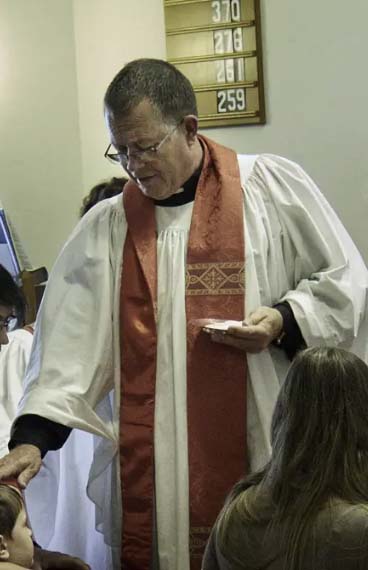What should you do when someone hurts you deeply? What does prayer have to do with that?
Have you ever had someone deeply hurt you, perhaps even abuse or defraud you, perhaps even doing that again and again?
Did you have a serious problem forgiving that person?
I’m going to recommend three ways that you can offer forgiveness to someone that’s deeply offended you and sinned against you. I am also going to put that in the context of our prayer life.
As we've discussed before, prayer is at its core a conversation with God, Father, Son, and Holy Spirit. Prayer is the lifeblood of our relationship with God.
Why do we need to forgive?
Why We Forgive
First, our Lord, Jesus Christ commands it. Refusing to forgive is sin.
Second, if we do not forgive, we are not forgiven. Jesus even wove that into the prayer that He taught His disciples – “forgive us our
trespasses as we forgive those who trespass against us.”
Third, a lack of forgiveness hurts us body, mind, and spirit. The effects of serious unforgiveness may even shorten our life.
Let’s start with a situation where someone has hurt us deeply, and we know that as a Christian we’re called to forgive them... but we’re struggling to do that.
The first way that you’re going to be able to offer forgiveness to someone who has deeply hurt you is to remember is that forgiveness and reconciliation are not the same thing.
The Difference Between Forgiveness & Reconciliation
Many people struggle with the commandment to forgive everyone who has sinned against us just as God has forgiven us because it feels like we’re just sweeping someone’s sin under the rug. Like they’re just getting off scot free and, somehow, we are opening ourselves to being hurt again. Then we just have to pretend like that evil didn’t happen but we’re deeply hurt. That seems more hurtful to us to say, “I forgive you.”
The reality is—as Christians—we are called to forgive every single offense that happens to us no matter how bad it is. But we’re not called to keep making ourselves a target or to reconcile to every single person that hurts us in a damaging way. The difference between reconciliation and forgiveness is that forgiveness is when we’re no longer holding the debt against that person, especially in the spiritual sense, where we believe that that person should be condemned for their sins against us.
Forgiveness says, “I forgive you and I’ll release you of the penalty that you rightfully deserve to pay”.
Reconciliation is very different. Reconciliation restores a relationship to what it once was before the sin and offense occurred.
Reconciliation is good and biblical, and that should always be the goal if possible.
Generally, I have found that reconciliation cannot occur unless the offender repents. Sometimes, I find that I had some part to play in the situation, and I have to repent of a sin or learn a hard lesson. Wisdom can often come from failures and hurts. Hurts will come to us all. The question is how we let God use those hurts and scars perfect us into what we are to become.
It would actually be extremely unbiblical to try to reconcile with somebody who’s hurt us and does not repent.
The Matthew 18 Framework
For example, in Matthew 18 Jesus gives us three steps to go through when another brother or sister in Christ sins against us.
Step 1: Go to that person one-on-one.
Step 2: Go with two or three witnesses.
Step 3: Bring it to the church for their judgment.
After Step 3, if that person still doesn’t repent, we’re told to treat them like an unbeliever.
Since Scripture tells us that we’re not supposed to be unequally yoked with unbelievers, Jesus is actually saying, if the relationship can’t be restored, don’t try to force reconciliation. It’s unhelpful to be reconciled with a rebel.
For unbelievers, we still are commanded to forgive. While the writer of Hebrews said that we should “strive for peace with everyone,” wisdom may inform us that there are some unbelievers that we should just avoid rather than to seek reconciliation with them. Those are cases where forgiving, praying for, and seek to bless them is some small way is the best we can do.
God doesn’t say “OK, come into my presence in your unrepented sin, and no matter what I’m just going to let you be blessed.”
Rather, this is a time of salvation when God offers forgiveness until the Great Day of Judgment.
If we repent, God pays for our sin with the blood of Jesus Christ. So likewise, we can offer forgiveness to every single person because of the sacrifice of Jesus Christ that has freed us from God’s judgement. We even can ask God the Father to forgive those who wrong us, following the example that Jesus gave on the cross when He asked the Father to forgive those who crucified Him, or the example of Stephan, the first martyr who asked God to forgive those who stoned him.
That doesn’t mean that you have to Have the restored relationship again. In extreme cases, where something criminal or abusive happened, God isn't saying “allow yourself to be abused again” or “don’t report that crime to the police.” Protecting ourselves and reporting crimes are biblical.
However, when even when some terrible abuse or crime happens to us, God calls us to forgive that attacker.
The second way that we can offer forgiveness to someone who’s hurt us deeply is through our faith in God and demonstrating God’s love through our
actions, while trusting in God as our avenger.
Forgive Man, Trust God
We need to focus on the sure knowledge that God will bring perfect justice and will bless us in such a way that even death cannot stop that blessing.
We need to focus on God.
Ultimately. we are unable to offer this amazing grace to people if God’s not in the picture and when we’re not living from the grace of Jesus Christ. If we act like normal unredeemed humans, then the best we can do is just what’s fair.
Scripturally, Christians are called to treat people better than fair. We’re not called to just say to the offender, “hey, you know you deserve
this, because this is justice”. We’re actually called to treat people better than they deserve. Why? Because they are created in the image of God and God gave us better than we deserved. Many people have come to repentance because a Christian that they had wronged gave back good rather than evil.
This is an area where we can receive the power of the Holy Spirit when seek it with prayer. The only way we’re really going to be able to offer forgiveness to someone who doesn’t deserve that forgiveness is through our faith in God and His Holy Spirit within us.
The third way to forgive someone who has hurt us deeply is to prayerfully seek to understand God’s forgiveness for us and to prayerfully seek to grow into the likeness of Jesus Christ.
How is it that God forgives us when we don’t deserve it?
God the Father forgives us because He loves us and wants us to be in His presence. The Father loves us so much that He sent His only begotten
Son to suffer and die on the cross for us. God wants that godly love to grow in us, that we would grow into the likeness of Jesus.
The Father also sent Jesus to suffer and die for the people who sin against us and offers us the opportunity to be co-workers in their salvation. His will is for those who misuse us to be forgiven and come into the family of God. We don't owe our forgiveness to the person who wrongs us. We owe our forgiveness of those that wrong us to God, and to honor the sacrifice of Jesus Christ to forgive those because that’s why He came.
We were saved to grow godly character in us.
Imitate Christ
Jesus didn’t just come to set us free from our own sin. He came to set us free from the bondage of being unforgiving. If you want to be truly free in your heart, one of the most important things to do is to not only to receive forgiveness from God, but also offer that forgiveness to those who’ve wrong us. Godly love cannot be hoarded. Without the sacrifice of Christ we couldn’t do that.
But when we look at the cross, we can say, "You know what? That person who wronged me doesn’t deserve my forgiveness. They deserve to pay for what they’ve done to me. But Jesus Christ took that person’s penalty so that God could put the righteousness of Christ onto that person."
Our loving Father in Heaven put our unrighteousness on Jesus so that He could put Jesus’ righteousness on us. Paul told us that in Second Corinthians 5:21, “For our sake he made him to be sin who knew no sin, so that in him we might become the righteousness of God.”
In summary, we must forgive because: 1) God commands it and refusing is sin; 2) if we do not forgive, we are not forgiven; and, 3) unforgiveness hurts us body, mind, and spirit.
There are three ways that can help us move to forgiveness:
- Remember is that forgiveness and reconciliation are are not the same thing.
- Grow in our faith in God and demonstrate God’s love through our actions, while trusting in God as our avenger.
- Prayerfully seek to understand God’s forgiveness for us and grow into the likeness of Jesus Christ. Christ continually gave us examples of forgiving those who hurt Him, to include those who crucified Him.
Finally, we have the Holy Spirit dwelling within us from the moment of our baptism. If we pray for the Holy Spirit to grow a Christ-like spirit, we can have a peace that passes human understanding and grow in the love of God, even to the point of forgiving those who seem unforgiveable.




